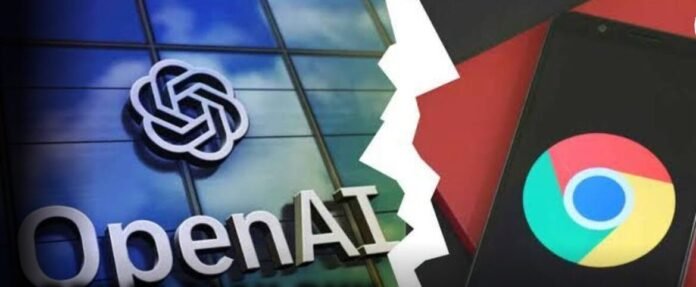OpenAI executive says company would be keen on acquiring chrome if antitrust forces sale.
OpenAI, the creator of ChatGPT, has expressed interest in acquiring Google Chrome, the world’s most popular web browser, if the tech giant were compelled to sell it due to ongoing antitrust proceedings. The revelation came from Nick Turley, an executive at OpenAI, who was testifying in a US government monopoly trial against Google.
The trial is part of the Department of Justice’s (DOJ) efforts to break up Google, arguing that the company holds too much market dominance, particularly in online search. Google, on the other hand, insists that Chrome is not for sale and has sought to have the case dismissed.
Currently, Chrome commands approximately 64% of the global browser market, according to analytics firm Similarweb, with Apple’s Safari in second place, holding just 21%. This dominance has made Google a primary target in the ongoing scrutiny of big tech companies and their monopolistic behaviours. The government has already secured victories against Google in other cases, including the company’s monopoly on online search and its illegal practices in online advertising technology. Both decisions are expected to be appealed by Google.
In his testimony, Turley suggested that OpenAI could step in to purchase Chrome if forced. OpenAI’s interest stems from the broader context of the AI revolution, where newer AI technologies are increasingly integrated with internet search. As generative AI models like ChatGPT utilise search to enhance results and counter the issue of “hallucinations” (false information generated by AI), access to a dominant search platform like Chrome could provide a strategic advantage.
Notably, Turley recalled an instance where OpenAI proposed a deal to Google, seeking to integrate Google search results into ChatGPT. However, this offer was rejected by the tech giant, leaving OpenAI with no current partnership with Google. Instead, OpenAI has a significant partnership with Microsoft, which includes the use of Microsoft’s Bing search engine and Edge browser.
Despite OpenAI’s ambitions, Google is not sitting idle. The company has developed its own suite of generative AI products, such as Gemini, which directly competes with ChatGPT. This rivalry between the two AI titans has intensified as both companies seek to leverage AI’s potential in transforming the internet and search engines.
The trial, which began in Washington DC, is expected to last three weeks and is being closely monitored by other tech giants, including Meta, Amazon, and Apple. All of these companies are currently facing their own antitrust challenges from the DOJ.
In a separate but related development, reports surfaced last week suggesting that OpenAI may be looking into creating its own social media platform. Although the project is still in its infancy, there are whispers that OpenAI and its CEO, Sam Altman, are gathering feedback for a potential rival to X, the social platform founded by Elon Musk. Interestingly, Altman and Musk were once business partners, but their relationship soured after a dispute over the direction of OpenAI. Meanwhile, X has integrated its own AI tool, Grok, into its platform, further highlighting the growing overlap between social media and artificial intelligence.
As OpenAI continues to expand its footprint across various tech sectors, its move to potentially acquire Chrome would represent a bold step in challenging Google’s longstanding dominance in both the browser and search engine markets. While it remains to be seen whether such a move will ever come to fruition, the trial and its potential outcomes will undoubtedly shape the future landscape of big tech.
